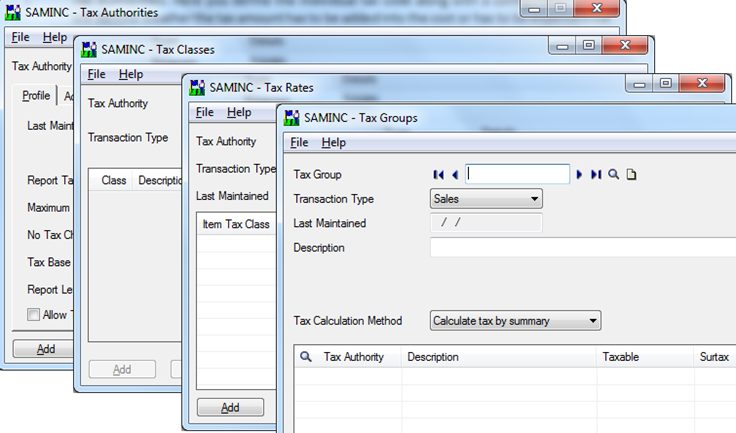Tax always has been a very vital component when it comes to executing a business. When tax components are involved into a financial transaction, not only the customers and vendors are influenced but also, the legal entities too have a governing interest towards the details of the taxes included.
The entire repository related to taxes has to be maintained very well as per the rules and regulations defined by the legal entities and it has to be shared in a timely manner with them. Thus, to make sure we store it in a proper manner; we first have to ensure that we are configuring it in a way we require.
New Stuff: AP Payment Inquiry
Thus when it comes to taxes in Sage 300 ERP, it has a concrete way to handle all the requirements related to these taxes in aspect of both the configuration and reporting. The configuration part has four easy steps to configure a tax master, below are those four steps:
i. Tax Authorities: Here you define the individual tax code along with a configuration which will denote weather the tax amount has to be added into the cost or has to be expensed out when it comes to purchase. We also define a liability account which is going to be used for Sales Transactions.
ii. Tax Classes: Here we define the classes for the authority which is defined in step 1. Basically it will have two classes one would be taxable and other would be non-Taxable.
iii. Tax Rates: Now assign rates to the authorities which would be responsible for calculating the tax amounts.
iv. Tax Groups: In this step we group different tax authorities together as a certain invoice might have multiple interdependent tax codes involved in it.
Apart from these Standard Taxes which ideally appear in every part of the world, Sage 300 ERP specially has few add-ons which are country specific. As Sage is a Global product with local focus it caters to various business markets effectively. For example, consider a case of the nation India, where Tax covers huge sectors of the business. India has different types of taxes with different backgrounds and thus it becomes very critical to make sure the system we are using fulfills all the statuary requirements.
Some of the add-ons, developed by Sage for India are Tax deducted at Source, Manufacturing and trading excise. Below links will help you go through these add-ons.
- http://www.greytrix.com/blogs/sageaccpacerp/tag/tds/
- http://www.greytrix.com/blogs/sageaccpacerp/tag/trading-excise/
- http://www.greytrix.com/blogs/sageaccpacerp/tag/manufacturing-excise/
The concept of taxes is very crucial when it comes to executing a business and thus choosing the right system which will serve the purpose accurately is very important.
Also Read:
1. Tax Tracking Report in Sage 300 ERP
2. Setting up Price Inclusive of Taxes in Sage 300 ERP
3. Configure Reverse Charge Mechanism for Service Tax in Sage 300 ERP
4. Tax Calculation on the basis of Quantity in Sage 300 ERP
5. Handling Tax Deducted At Source (TDS) on Rent Paid in Sage ACCPAC ERP.
